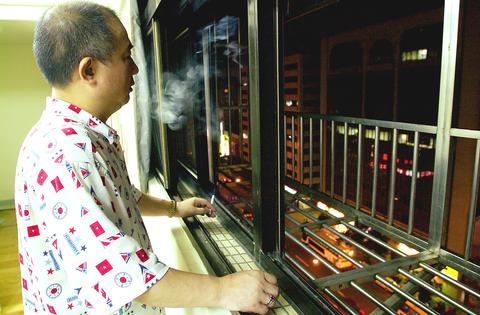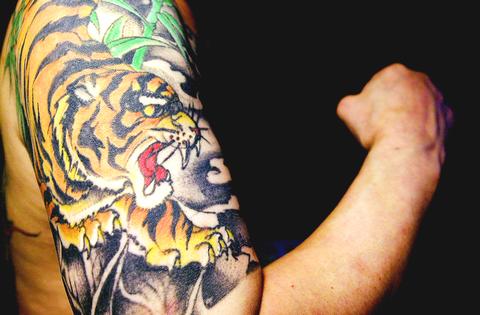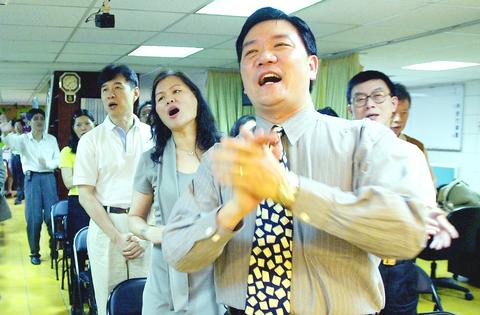When Szu Ke (
"Of course, I could gamble away NT$10 million a night as well," said the 49-year-old senior headman of the Ta An Gang (大安角頭), who wears an NT$1 million Rolex diamond watch on his left wrist and an NT$20,000 sapphire silver ring on his right middle finger.

PHOTO: GEORGE TSORNG, TAIPEI TIMES
Now he seldom gambles, he said. Instead, he owns a construction company offering piping and water leakage repair services. His income fluctuates from NT$1,000 to NT$20 million a day.

PHOTO: GEORGE TSORNG, TAIPEI TIMES
"It's getting tougher to make a living nowadays," he said, lighting up a cigarette.
Szu Ke joined the gang at the age of 17. He started out as a body-guard at a gambling house, collecting debts for the owner.

PHOTO: GEORGE TSORNG, TAIPEI TIMES
In 1972, he was sentenced to five years in prison after killing someone in a fight. He got into trouble again in 1983 when he was imprisoned for three years on illegal firearms possession, and for one year on a 1995 charge of ordering someone else to commit a crime on his behalf.
Although he was finally found not guilty of the 1995 charge, he said he lost confidence in the judicial system and got sick of the KMT-ruled government.
For the miscarriage of justice, he said, he has filed for national compensation at the cost of NT$5,000 a day for the one-year jail term.
"Damn, even NT$10,000 a day in compensation couldn't give me back my youth," he said.
Just recently KMT city councilors Chen Hui-min (
But with Taiwan's economy struggling, the actual impact of organized crime groups is overrated and times for them, just like everyone else, are tough right now, Szu Ke said.
"The economic slowdown has literally pushed us to a state of hibernation. It's rather hard to grow bigger and stronger at this time of year," he said.
Frank Huang (黃富源), a criminology professor at the Central Police University (中央警察大學), agreed.
"Taiwan's organized crime syndicates are comparatively miniscule in terms of size and the way they make money," he said. "Take Japan's Yamakuchi Kumi, for example. It boasts a membership of 20,000, while Taiwan's largest organized crime syndicate, the Bamboo Union (
Huang said his studies show that Taiwan's organized crime has declined over the years in terms of size and quality of life.
"There are two major activities associated with organized crime -- violence and profits related to drug dealing, gambling and the porn business. But we don't see these activities on a large scale with Taiwan's organized crime groups," he said. "What we frequently see is gangsters forcing innocent young students to peddle cell phones or pornography."
He said his studies also indicate that organized crime syndicates make their living mainly by peddling drugs, accounting for about 40 percent of their income; human trafficking, accounting for about 30 percent; and rigging construction projects, accounting for about 20 percent.
Because most of the headmen of organized crime syndicates were forced out of the country during the large-scale police crackdown in the 1980s, the power struggles within the organizations have weakened their stamina, Huang said.
"There are three indicators showing that Taiwan's organized crimes are going downhill," he said.
"First of all, there are no influential leaders within the groups. Secondly, the way they gang up to collect money is pathetic. Finally, the funeral ceremonies of major gang figures are becoming more and more modest."
Statistics obtained from Taipei City's Crime Investigation Corps (
The Bamboo Union still ranks as the largest organized crime syndicate, followed by the Four Seas Gang, the Sung Lien Gang (松聯幫) and the Pei Lien Gang (北聯幫). In Taipei City, the largest concentration of gangs is in Chungshan District, which is followed by Ta An, Tatung and Wanhua.
Others, like Szu Ke, are deciding that the profession isn't worth it.
Da Tou (大頭), or Big Head, a former member of the Hsichou Gang (溪州角頭), earned his living by collecting debts for the owner of a gambling house and "solving problems" for consignees when he first got into the circle at the age of 16.
"Back then I could make as much as NT$40,000 a month," said Da Tou, sitting in his 10th-floor tattoo parlor office in downtown Taipei.
In addition to collecting debts, he said, he collected "protection fees" from shops and construction companies. When the entertainment business was booming in the 1960s and 1970s, he was also involved in rigging entertainment performances at theaters.
"There were two things we didn't touch," he said. "Women and drugs. We were warned by our mentors that those were the most lethal things in the world because once you're hooked, you're screwed."
They weren't interested in fire arms, either, he said.
"So you were heavily armed, but how could you surpass the firepower of the military and the police who are equipped with tanks and F-16s? Why raise cows when you can drink milk?" he said.
After serving a two-year jail sentence for manslaughter, Da Tou said he quit the gang at 29 and began a new life by opening a construction company with six other shareholders.
The business, however, didn't last long and ended in 1994. One year later, he put down NT$1.8 million to open a tattoo parlor in downtown Taipei.
"I'm not making big profits out of it, so I'm thinking of getting a license for operating a waste soil dumping ground," he said.
"We've found the land and are now waiting for the license to be approved."
If approved, he can sell the license to waste soil dumping companies to dispose of waste soil at the site. He can then charge the companies per truckload of waste soil.
The market price for a dumping license costs about NT$100 per cubic meter and the fees can cost as much as NT$1,800 per 10-tonne truckload and NT$1,300 per 3.5-tonne truckload.
"Let me tell you something, you don't need to be afraid of gangsters, but you should be very careful with politicians and profiteers because they're the very origin of social instability," he said.
Some gangsters are getting into professions one would never have imagined.
When the head of the Hsiao Cheng Da Gang (小政大幫) needed help "taking care of some business" with the Blue Eagle Gang (藍鷹幫), he turned to his buddy, David Lu (呂代豪), a Taekwando practitioner.
Lu then rallied 10 other close friends who are ferocious fighters to join the fray. They managed to get eight samurai knives and six seven-meter long sharpened bamboo sticks.
On the night of Sept. 30, 1972, the two groups had a vicious fight. The eight-minute battle left one dead and six seriously injured.
Lu was among the suspects wanted by the police. Afraid of being arrested, Lu, then 18, quit school and joined the Flying Eagle Gang (
"Back then I got a kick out of heroism and my wildest dream was to become an international professional hit-man," said Lu, 47.
As an entry-level gangster, he started out as a bodyguard at bars and gambling houses collecting debts from gamblers.
"We were lucky to get back 80 percent of, say, an NT$1.2 million debt," he said. "Out of the money we retrieved, the owner of the gambling house got 60 percent, while the rest came to us, and each of us could get as much as NT$60,000," he said.
For the following seven years, he was in and out of prison and did jail sentences at various prisons, including the maximum security Orchid Island and Green Island prisons.
In a dramatic twist of fate, Lu was baptized as a Christian in 1979 and enrolled in the Christ Discipleship Training Institute (
He got married in 1982 at the age of 28 to a woman who is also a Christian. She was the only one who kept almost daily correspondence with him during his six-year imprisonment.
Now Lu is a full-time pastor at the Capital Revival Church (首都平原基督教會). He is also the dean of the Church Planting Evangelical Seminary (拓荒宣教神學院) and the president of the Worldwide Chinese Missionary Fellowship Foundation (中國宣教使命團基金會).
"I've gone through four major stages in my life," he said. "When I was young, my soul was in prison although my body was free. When I was serving my sentence, my body and my soul were imprisoned. When I accepted Jesus as my savior, my soul was free although my body was imprisoned. And then when I got out of jail and became a Christian, both my body and soul were liberated."

Chinese Nationalist Party (KMT) lawmakers have declared they survived recall votes to remove them from office today, although official results are still pending as the vote counting continues. Although final tallies from the Central Election Commission (CEC) are still pending, preliminary results indicate that the recall campaigns against all seven KMT lawmakers have fallen short. As of 6:10 pm, Taichung Legislators Yen Kuan-heng (顏寬恒) and Yang Chiung-ying (楊瓊瓔), Hsinchu County Legislator Lin Szu-ming (林思銘), Nantou County Legislator Ma Wen-chun (馬文君) and New Taipei City Legislator Lo Ming-tsai (羅明才) had all announced they

CHAMPIONS: President Lai congratulated the players’ outstanding performance, cheering them for marking a new milestone in the nation’s baseball history Taiwan on Sunday won their first Little League Baseball World Series (LLBWS) title in 29 years, as Taipei’s Dong Yuan Elementary School defeated a team from Las Vegas 7-0 in the championship game in South Williamsport, Pennsylvania. It was Taiwan’s first championship in the annual tournament since 1996, ending a nearly three-decade drought. “It has been a very long time ... and we finally made it,” Taiwan manager Lai Min-nan (賴敏男) said after the game. Lai said he last managed a Dong Yuan team in at the South Williamsport in 2015, when they were eliminated after four games. “There is

Nvidia Corp CEO Jensen Huang (黃仁勳) yesterday visited Taiwan Semiconductor Manufacturing Co (TSMC, 台積電), as the chipmaker prepares for volume production of Nvidia’s next-generation artificial intelligence (AI) chips. It was Huang’s third trip to Taiwan this year, indicating that Nvidia’s supply chain is deeply connected to Taiwan. Its partners also include packager Siliconware Precision Industries Co (矽品精密) and server makers Hon Hai Precision Industry Co (鴻海精密) and Quanta Computer Inc (廣達). “My main purpose is to visit TSMC,” Huang said yesterday. “As you know, we have next-generation architecture called Rubin. Rubin is very advanced. We have now taped out six brand new

POWER PLANT POLL: The TPP said the number of ‘yes’ votes showed that the energy policy should be corrected, and the KMT said the result was a win for the people’s voice The government does not rule out advanced nuclear energy generation if it meets the government’s three prerequisites, President William Lai (賴清德) said last night after the number of votes in favor of restarting a nuclear power plant outnumbered the “no” votes in a referendum yesterday. The referendum failed to pass, despite getting more “yes” votes, as the Referendum Act (公民投票法) states that the vote would only pass if the votes in favor account for more than one-fourth of the total number of eligible voters and outnumber the opposing votes. Yesterday’s referendum question was: “Do you agree that the Ma-anshan Nuclear Power Plant